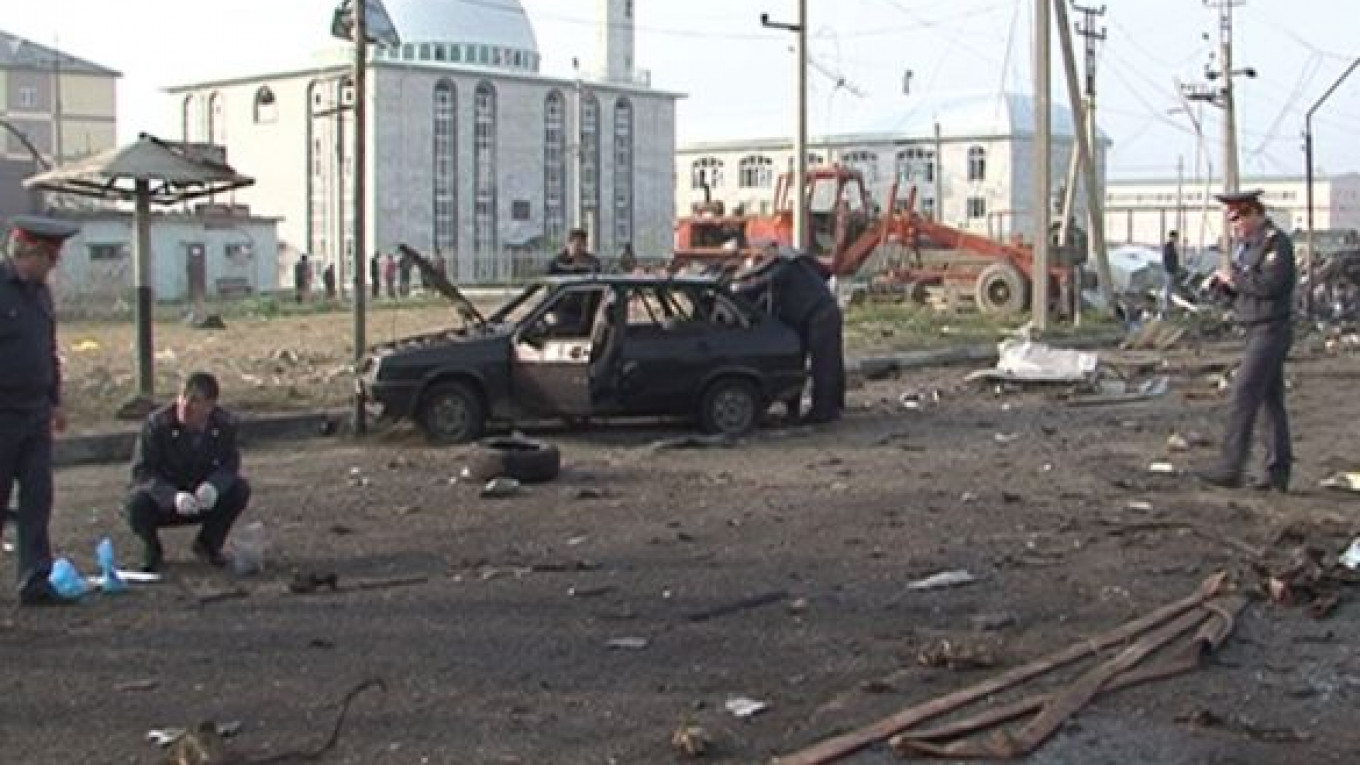Twin suicide car bombs killed at least 13 people and wounded just over 100 more in the Dagestani capital Makhachkala late Thursday, in what police are calling a terrorist attack.
Analysts said the attack was further evidence of the government’s inability to bring peace to the restive North Caucasus, but warned against linking it to Vladimir Putin’s inauguration on Monday.
The toll from the bombings made it the most deadly terrorist attack since the January 2011 bombing at Domodedovo Airport that killed 37.
There was no immediate claim of responsibility, but police told Interfax that they had information about who organized the attack and released a list of wanted alleged gang members, all in their 20s.
Many of the dead and wounded were police and rescue workers who rushed to the scene after the first bomb exploded in a Mitsubishi sedan on the outskirts of town at about 10:28 p.m., near a checkpoint called Alaska-30 along the Makhachkala-Astrakhan highway.
The bomb contained about 30 kilograms of TNT, officials said Friday.
Twelve minutes after the first explosion, a bomb containing about 50 kilograms of TNT, which was hidden in a minibus, exploded, sending deadly shrapnel flying and leaving a 30-centimeter crater in the asphalt, police said in a .
Investigators have found fragments of bodies that could belong to the attackers, including a man’s foot and pieces of a woman’s body, a police source told Interfax.
A preliminary inquiry showed that one of the suicide bombers was 23-year-old Rizvan Aliyev from Makhachkala, a law enforcement source told Interfax. The identity of the suspected female bomber was unknown as of Friday evening.
Earlier reports said the attack was allegedly carried out by Aliyev and his 19-year-old sister, Muslimat. Both have been on the wanted list after having gone missing late in April.
All those wounded — including 34 police officers and 55 civilians — were taken to local hospitals, police said.
“One of the versions is that the purpose of the attacks was specifically to harm policemen. It explains how the twin bombing was organized,” an unnamed law enforcement official told RIA-Novosti.
Dagestani President Magomedsalam Magomedov said in a statement on his website that the attack was aimed at disrupting bridge-building within the republic’s Muslim community.
Tatyana Lokshina of Human Rights Watch pointed to a recent meeting between Sufi and Salafi leaders that was seen as a sign of reconciliation after years of tension.
“Whoever’s behind this attack is possibly not content with any signs of a possible truce. What they want is an intensification of hostility in the region,” she said, adding that the meeting had more regional significance than Putin’s upcoming inauguration.
The bombs could also have been intended for a May 9 Victory Day celebration, said Enver Kisriyev, head of the Caucasus section of the Russian Academy of Sciences’ center for civilization and regional research.
The Federal Security Service and the Interior Ministry have organized emergency operational search activities and police opened a criminal terrorism case in connection with the incident.
Dmitry Medvedev ordered that Magomedov provide aid to the families of those killed and injured in the attacks, according to a statement posted on the Kremlin website. Putin didn’t comment on the incident on Friday.
The U.S. Embassy and the European Union issued a statement Friday condemning the attacks.
Armed conflicts between militants and security forces are frequent in the North Caucasus. In early March, a female suicide bomber blew herself up at a traffic post about 40 kilometers south of Makhachkala, killing five cops.
“Dagestan is burning. Dagestan is at war,” Kisriyev said.
Putin has based his decade-long rule partly on his ability to maintain order and security, especially in the North Caucasus. The challenge seems to remain after he starts his third presidential rule next week.
A Message from The Moscow Times:
Dear readers,
We are facing unprecedented challenges. Russia's Prosecutor General's Office has designated The Moscow Times as an "undesirable" organization, criminalizing our work and putting our staff at risk of prosecution. This follows our earlier unjust labeling as a "foreign agent."
These actions are direct attempts to silence independent journalism in Russia. The authorities claim our work "discredits the decisions of the Russian leadership." We see things differently: we strive to provide accurate, unbiased reporting on Russia.
We, the journalists of The Moscow Times, refuse to be silenced. But to continue our work, we need your help.
Your support, no matter how small, makes a world of difference. If you can, please support us monthly starting from just $2. It's quick to set up, and every contribution makes a significant impact.
By supporting The Moscow Times, you're defending open, independent journalism in the face of repression. Thank you for standing with us.
Remind me later.






